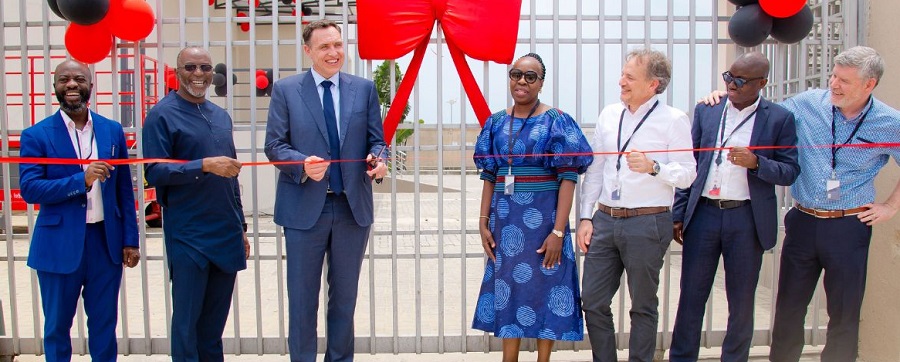E-Business
Re-imagining the Business School Model

By Austin Okere
This pandemic has uncovered the soft underbelly of our unwillingness to think beyond the present and anticipate future eventualities.

There have been various experiences and pronouncements regarding the education of our youth in the past couple of weeks. At the local secondary level, my son’s school completed the syllabus for the current term through online classes at home.
Far afield, the Harvard University is offering 67 online courses for free to help academics through lockdown and quarantine; while Coursera is partnered with 192 institutions from 43 countries and offering more than 3,200 online courses in 13 languages.
In sharp contrast, the Kano State Government has ordered all schools to stop online classes immediately, while the Academic Staff Union of Universities (ASUU) through an interview of their President, Prof. Biodun Ogunyemi with the Punch Newspaper has declared that E-Learning cannot work in Nigeria.
In his TED talk on the three ways to plan for the very long term, Ari Wallach canvasses: Trans-generational Thinking (thinking beyond just your own lifetime), Thinking of possible futures and not just one future, in case of eventualities. And having a 30-year horizon in our thinking process, not just the next couple of years.
I wrote this article four years ago, when I was invited as the Keynote Speaker at the GBSN/EFMD joint Conference at Accra, Ghana in November 2016.
It seems that the chickens have come home to roost.
The EFMD is a leading international network of business schools and companies (820 members from 82 countries) at the forefront or raising the standards of management education and development globally. EFMD runs the EQUIS and EPAS accreditation systems as well as the EFMD Deans Across Frontiers development programme (EDAF) and is one of the key reference points for management education worldwide.
The GBSN is a nonprofit organization dedicated to strengthening management, entrepreneurial and leadership talent for the developing world through better access to quality, locally relevant education. GBSN harnesses the power of a network of nearly 70 leading business schools that share a dedication to their mission to build management education capacity for the developing world.
Even though I spoke about Business Schools. The insights stretch across the whole educational system. The Chinese use the same expression for Challenge and Opportunity because they are the two sides of the same coin.
We should not waste the crises of this painful pandemic, but rather exploit the opportunity to plan for Sustainability in our education system across all levels.
Time there was when an MBA from an Ivy League College will guarantee you a very lucrative high-profile job. This seems no longer to be the case.
I must tell you this story about a Kenyan lady who was settled in the UK. She had borrowed heavily to do an MBA at a business school hoping that this will secure her future.
Three years after graduation, she was facing eviction from her Council accommodation for back rents and no job in sight, albeit with a huge student loan overhang.
You cannot but empathise with her in her confusion, when through streaming tears, she told the court bailiffs how disappointed she was that she did everything right and felt rather short-changed by the system.
In my view, the real questions become: Are we setting the right expectation for Business School aspirants? Have schools missed the train of the Digital Revolution? Why are they refusing to innovate in today’s age of Digital Platforms?
After over a decade of being an Entrepreneur-in-Residence at Columbia Business School in New York, and serving on the World Economic Forum’s Global Agenda Council on Innovation and Intrapreneurship, these are my insights about the need to re-imagine the Business School model to produce graduates who can thrive now and into the future:
- We need to start teaching people to learn “how to learn” than just to learn to master something, in this fast-disruptive world.
- The inverted classroom should be the new norm – the creative contribution of the class with a facilitator is much more effective than the messianic delivering of long lectures by a “professor”.
- To what extent are business schools allowing influence from markets – is there a concept of Entrepreneur-in-Residence or Professor of Practice attached to the school, linking industry experience and market expectation with learning concepts in business schools?
- Are we empowering students to create their own entrepreneurial or intrapreneurial spaces after graduation – today’s knowledge workers prefer to sell their time and talents to many organisations and be paid on an outcome basis than get stuck in a “9 to 5” job with one company – For example, Upwork provides a platform for matching requirements with skills in the shared economy.
- How can we encourage business schools to explore structures that teach how to leverage the need for inclusiveness, by bringing products and services to non-consumers through low-cost efficiencies and wider availability than fierce competition in a shrinking pie of current consumers?
- How can education reach more people more affordably? Massive Open Online Courses or MOOCs is gradually taking the toll off traditional schools leveraging the ubiquity of broadband and connected devices – how well have we embraced the concept of MOOCs – concerns around quality of programs and teachers, while relevant, should not stop this viable way of reaching more people. They should be seen as a complement to traditional business schools than competition, especially in emerging markets, where 80% of the world resides, and are more likely to be excluded in formal settings.
- It is important for Regulation to catch up in this new area, as we open the door to online education and degrees
Clearly, hoping for an automatic lucrative job after an MBA is now a myth. The reality is that you should think along the lines of Bring Your Own Work (BYOW) to the party – this speaks to the need for deep entrepreneurial empowerment in the business school curriculum, and alignment to industry and social realities.
In my view, it is an indictment on the education system that many companies are now acting as their own incubation centres with University-like academies for new employees, following the apparent disconnect between graduating students and the job requirements of today. I believe that Universities should be collaborating with these centres to obtain valuable feedback for their curricula.
The biggest threat to success is success itself. Business Schools have been very successful over centuries. It is difficult to simulate hunger when you are full. You get into a comfort zone, and complacency sets in. You tend to assume an arrogance borne out of a false sense of invincibility that prevents you from opening yourself to any new ideas.
As change is the only constant in life, the ability to learn, unlearn and relearn, and continuously adapt has become crucial for survival and sustainability in the education sector. The global leadership space is like a game of musical chairs; always one chair short, to eject whoever is not able to adapt fast enough. Business Schools have to get on the innovation train in order not to be left behind on the tracks.
We used to say that big fish eat small fish, today it seems that it is the fast fish that eats the slow fish. It seems to me that there is no better time for deeper collaboration between town and gown than now.
Austin Okere is the Founder of CWG Plc, the largest security in the technology sector of the Nigerian Stock Exchange, and Entrepreneur-in-Residence at CBS, New York. Austin also serves on the Advisory Board of the Global Business School Network, and on the World Economic Forum Global Agenda Council on Innovation and Intrapreneurship. Austin now runs the Ausso Leadership Academy focused on Business and Entrepreneurial Mentorship.
E-Business
Equinix Launches LG2.3 Data Centre in Nigeria

Equinix, global digital infrastructure company, has launched a cutting-edge LG2.3 data centre in Lagos aimed at fueling Nigeria’s booming tech scene.

Equinix officials at the launch
The data centre is designed to provide businesses with secure, reliable, and high-performance colocation and interconnection services, crucial for supporting the increasing demand for digital services across the region.
Nestled in the bustling Lekki Free Zone, LG2.3 is packed with the latest tech, offering businesses the secure and lightning-fast connections they crave. Think of it as the engine room for Nigeria’s online world, designed to handle the explosive growth of digital services.
The launch featured Bruce Owen, president, Equinix’s EMEA, who cut the ribbon to open the data centre.
“Nigeria is our focus,” Owen declared, emphasizing Equinix’s dedication to powering the nation’s digital growth. “The energy here is incredible, and we’re excited to be part of it.”
On his part, Wole Abu, managing director, Equinix’s West Africa, echoed this sentiment highlighting the increasing global demand for digital infrastructure.
“Africa is on the cusp of a digital explosion, and we’re here to support that growth,” he said.
Nigeria’s digital adoption is skyrocketing, driven by a young, tech-savvy population. Businesses are racing to embrace online platforms, and LG2.3 is perfectly positioned to meet their needs.
This investment is set to create a ripple effect, boosting the economy, creating jobs, and fostering innovation.
LG2.3 is set to be a beacon for Africa’s tech potential.
Equinix’s confidence in the continent aims to attract more global players, turning Africa into a digital powerhouse.
This data centre will act as a vital connection hub, empowering businesses to connect and collaborate, bridging the digital divide.
Equinix’s vision extends beyond Nigeria, with plans to expand across Africa.
strategic move reflects their commitment to building a connected and thriving digital ecosystem.
The success of LG2.3 is a testament to the power of public-private partnerships, with the Nigerian government playing a crucial role in attracting investment.
As Nigeria marches towards a digital future, Equinix’s LG2.3 data centre will be a key driver of progress. It’s a powerful symbol of Nigeria’s digital ambition and a catalyst for Africa’s tech revolution.
E-Business
Microsoft Marks 50th Anniversary with Major Copilot AI Update

Microsoft is celebrating its 50th anniversary with a major leap forward into artificial intelligence, unveiling significant updates to its AI assistant, Copilot.

The announcement was made on April 4, 2025, at the company’s headquarters in Redmond, Washington, marking a milestone for both Microsoft and the AI industry.
As the tech giant celebrates its golden anniversary, the company is setting its sights firmly on the future, particularly with its AI-driven tools.
Microsoft’s Copilot, which has been integrated into various software tools across its ecosystem, has now received a significant upgrade.
The new features aim to make the Copilot assistant more intelligent, personalised, and proactive, which positions Microsoft as a serious competitor in the AI space against other industry leaders such as OpenAI’s ChatGPT and Anthropic’s Claude.
Mustafa Suleyman, head of Microsoft’s AI division, expressed the company’s ambition, saying, “We envision Copilot not just as an assistant, but as a long-term AI companion, one that can learn, adapt, and evolve alongside its users. This goes beyond just responding to commands; it’s about fostering relationships between users and their AI.”
The most notable update to Copilot is its new memory functionality. Now, the assistant can retain information such as preferences, previously used commands, and even personal context, making it more responsive and efficient in future interactions.
This means Copilot can, for example, anticipate a user’s needs based on past behaviours, from scheduling meetings to suggesting restaurants for a night out.
In addition to the memory features, Copilot’s new “Vision” capabilities extend the AI’s functionality across multiple platforms. Windows and mobile users will now be able to interact with Copilot using both the camera and on-screen elements.
This includes actions such as booking appointments, managing tasks, and even shopping online — all in a more interactive and seamless way.
Scott Guthrie, Microsoft’s Executive Vice President, shared his enthusiasm about the potential of these advancements, stating, “With these new capabilities, we’re not just reacting to AI’s capabilities — we’re shaping the future of how users interact with technology. AI can do so much more than just assist with tasks. It can enrich the human experience.”
The updated Copilot is designed to challenge industry competitors like ChatGPT and Claude, offering more personalised and context-aware interactions.
Microsoft has positioned its Copilot as a tool that not only assists users but builds a deeper, more intuitive relationship over time.
The company has also placed a strong emphasis on AI accessibility. With AI’s growing role in everyday tasks, Microsoft aims to make it easier for users to adopt and benefit from these technologies, regardless of their technological proficiency.
Despite past challenges, including legal disputes over privacy and AI ethics, Microsoft continues to push boundaries in the AI space. Guthrie remarked, “This is just the beginning. As we continue to innovate, we are reshaping how people work, interact, and live with technology.”
With Copilot’s advancements, the tech giant hopes to continue its legacy of innovation, making AI tools accessible and useful for people around the world.
E-Business
Report Suggests a Slash in Mobile App Usage By 2027 Due to AI Assistants

By 2027 mobile app usage will decrease by 25 per cent due to AI assistants according to Gartner, Inc. Smartphone users will turn to AI assistants, such as Apple Intelligence, ChatGPT, Google Gemini, Meta AI, and others to replace apps for many functions.

In addition to the impact of AI assistants, apps will be consolidated across separate brands and companies, creating mobile app partnerships or consortiums to reach more users per app at scale and defray the cost of creation and maintenance.
“CMOs should begin scenario planning for the impacts of decreased mobile app usage,” said Emily Weiss, Senior Principal for the Gartner Marketing Practice.
“Brands with low app engagement and retention will likely be first impacted – this will be a positive development for brands that are not overly reliant on driving revenue via apps as app development costs will decrease.
Other brands may be severely impacted by the disintermediation of users turning to AI assistants for services. The loss of app users will also result in the loss of first-party data collection and the ability to reach fewer users via mobile push notifications,” Emily added.
By 2026, Over 1/3 of Web Content will be Created for the Purposes of Gen-AI Powered Search According to Gartner’s 2024 CMO Spend Survey of 395 respondents between February and March 2024, the average CMO allocated almost a quarter of their digital marketing budget to search.
Other than end users directly visiting a website, search currently drives more traffic to the average commercial enterprise website than any other referral source.
Given this, a loss of search driven traffic due to algorithmic shifts by major search engines would result in tangible, negative commercial impact to any organisation.
“CMOs will need to direct their teams to hire talent with a strong understanding of how GenAI, and broader AI influences, impacts the performance of their content in search algorithms,” said Weiss.
“It will be important to upskill the function by investing in search and content talent with AI skillsets. These associates will need to have familiarity with creating or optimising content to train and rank within evolving search algorithms,” she said.
By 2028 digital Mlmarketers will move 30 per cent of their paid social budget to support advertising and partnerships on subscription-based channels It is becoming more challenging for CMOs to maintain, let alone grow, their reach and engagement among consumers.
This is especially true as consumers shift their tech and media behaviors away from social media, to other platforms and subscription based channels.
Gartner’s 2024 CMO Spend survey found that since 2022, paid social has maintained the highest budget allocation for all digital media spend. In 2024, B2C Marketing leaders reported allocating 14.3 per cent for their digital channel budget to social media advertising (an increase from 12.3% in 2023).
“Closed group communities and subscription channels of – fer a potential alternative for social media weary consumers and content creators who want to do more than feed the algorithm,” said Weiss.
“Brands can leverage closedgroup subscription channels – such as Substack, Patreon, and Discord – and the professional creators on them to reach relevant target audiences who are already engaging with content they self-selected into consuming,” she added.
Current AI models, such as large language models (LLMs), lack the agency to autonomously execute tasks and adapt in complex environments.
However, as new levels of intelligence are added, new AI agents are poised to quickly become more capable and reliable as brands seek to address customer facing use cases.
“There will be more AI agents than people, so while current approaches require humans in the loop, this idea will quickly become antiquated.
Marketers will need to determine when and how they can trust AI agents to act on behalf of the brand and customers across key areas,” said Weiss.

 News1 day ago
News1 day agoUS Cancels Visas for All South Sudanese Passport Holders

 News1 day ago
News1 day agoAOT Issues Bench Warrant against Sanusi, Aero Contractors MD

 News1 day ago
News1 day agoMeningitis Outbreak Kills 151 in Nigeria – NCDC

 News1 day ago
News1 day agoAfrimash Launches USSD Code to Revolutionize Poultry Farming and Combat Counterfeit Farm Produce

 News1 day ago
News1 day agoSERAP Calls on Tinubu to Reject $1.08Bn Loan, Probe Missing Funds

 General News1 day ago
General News1 day agoUniversity Don Seeks Ban of Smartphones, Social Media in Schools

 News1 day ago
News1 day agoNigeria’s Debt Escalates to N144.67 Trillion, Fueled by Borrowing Surge

 General News1 day ago
General News1 day agoAmid Rising Investor Confidence in Nigeria, Woodhall Capital Foundation Trains Captains of Industry















